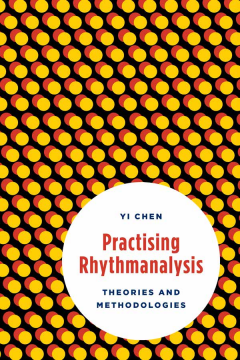
Additional Information
Book Details
Abstract
This book explores rhythmanalysis as a philosophy and as a research method for the study of cultural historical experiences. It formulates 'rhythm' as a critical concept which is defined in dialogic relationships to intellectual traditions, yet introducing unique philosophical positions that serve to re-think ways of conceiving and addressing cultural political issues.
Engaging with the notion of 'conjunctural shift', which for Stuart Hall captures the ruptured social landscape of Britain in the 1970s, the book then puts the method of rhythmanalysis to work by testifying the changing cultural experiences in rhythmic terms. This particular rhythmanalytical project instantiates while opening up ways of using rhythmanalysis for exploring cultural historical experiences.
.
Yi Chen is a Contextual and Theoretical Studies Lecturer at the University of the Arts London. Her research interests include experimental research method, cultural theory and visual culture.
This is an important book that pushes rhythmanalysis beyond its deep roots in philosophy and toward the vast and rich fields of cultural studies, visual culture, historiography, social theory and the social sciences. With a superb attention to the practical value of rhythmanalysis for embodied, emplaced, and time-attuned research Yi Chen intelligently embraces and highlights the immense value of rhythm for research methodology and sensuous scholarship.
Phillip Vannini, Professor of Communication and Culture and Canada Research Chair at Royal Roads University, Canada
Inspired by the fertile ideas of Henri Lefebvre, this intellectually ambitious and boldly experimental book succeeds in demonstrating the rich methodological potential of rhythmanalysis. By developing a sophisticated theoretical underpinning that variously draws on the new materialism, the theory of moments and phenomenology, the author shows how shifting constellations of rhythmic relations in time-space emerge during particular historical conjunctions. An account of Stuart Hall’s seminal account about the dramatic political shift rightwards during Thatcherism is followed by two engaging, substantive and richly illustrated chapters. These focus on how the embodied rhythms of walking and the institutionalized rhythms of the post office have responded to technological and political changes, material organization, new inhabitants, and circulating moods and ideas. Erudite yet highly readable, this innovative work marks a momentous leap forward for the theoretical and methodological deployment of rhythmanalysis.
Tim Endensor, Senior Lecturer in Human Geography, Manchester Metropolitan University
For decades now, Henri Lefebvre’s concept of rhythmanalysis has been as allusive (and elusive) as it is seductive for research across various disciplines in the arts, humanities and social sciences. Yi Chen’s book does us all a great service. By clarifying, refining, and extending the work that rhythmanalysis can do, Practising Rhythmanalysis has made the critical resonance and range of this concept even more vital for contemporary theories and methods.
Gregory J. Seigworth, Professor of Communication Studies in the Department of Communication and Theatre, Millersville University, USA; Co-editor of the The Affect Theory Reader
Table of Contents
| Section Title | Page | Action | Price |
|---|---|---|---|
| Contents | v | ||
| Acknowledgements | vii | ||
| Chapter 1. Introduction: Introducing Rhythmanalysis as a Field of Work | 1 | ||
| Chapter 2. The Philosophical Attention of Rhythmanalysis | 19 | ||
| Chapter 3. A Case Study of Rhythmanalysis: The Project of the 1970s’ Conjunctural Analysis | 53 | ||
| Chapter 4. Walking With: Conjoining Bodily Rhythms in London’s East End | 73 | ||
| Chapter 5. Assembling Postal Rhythms: The Polyrhythmia of Communications | 111 | ||
| Chapter 6. Conclusion: Rethinking Rhythmanalysis | 151 | ||
| Bibliography | 171 | ||
| Index | 183 | ||
| About the Author | 187 |
